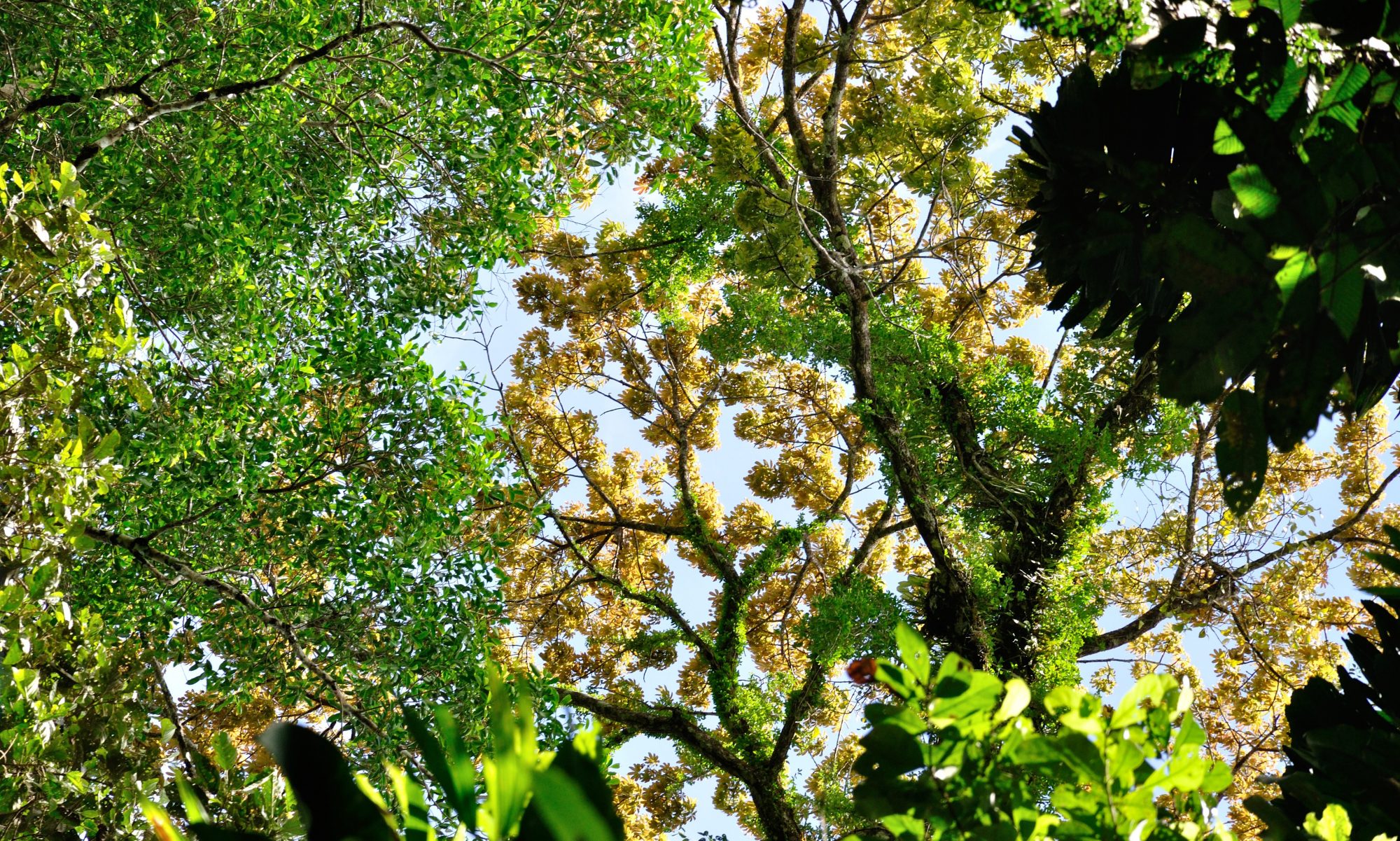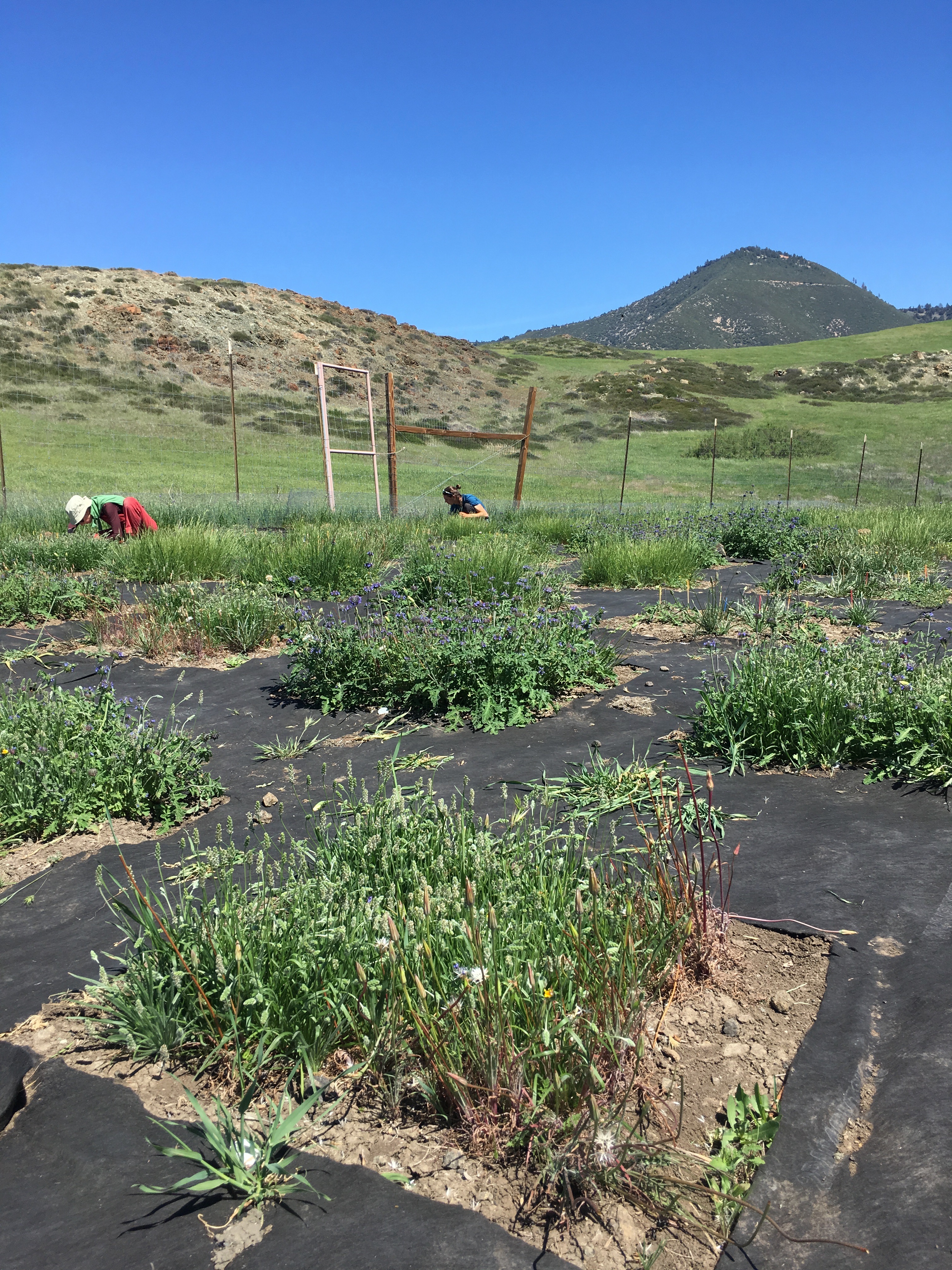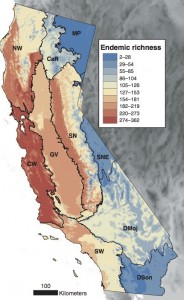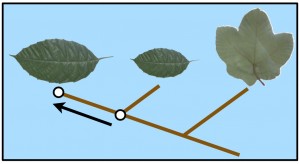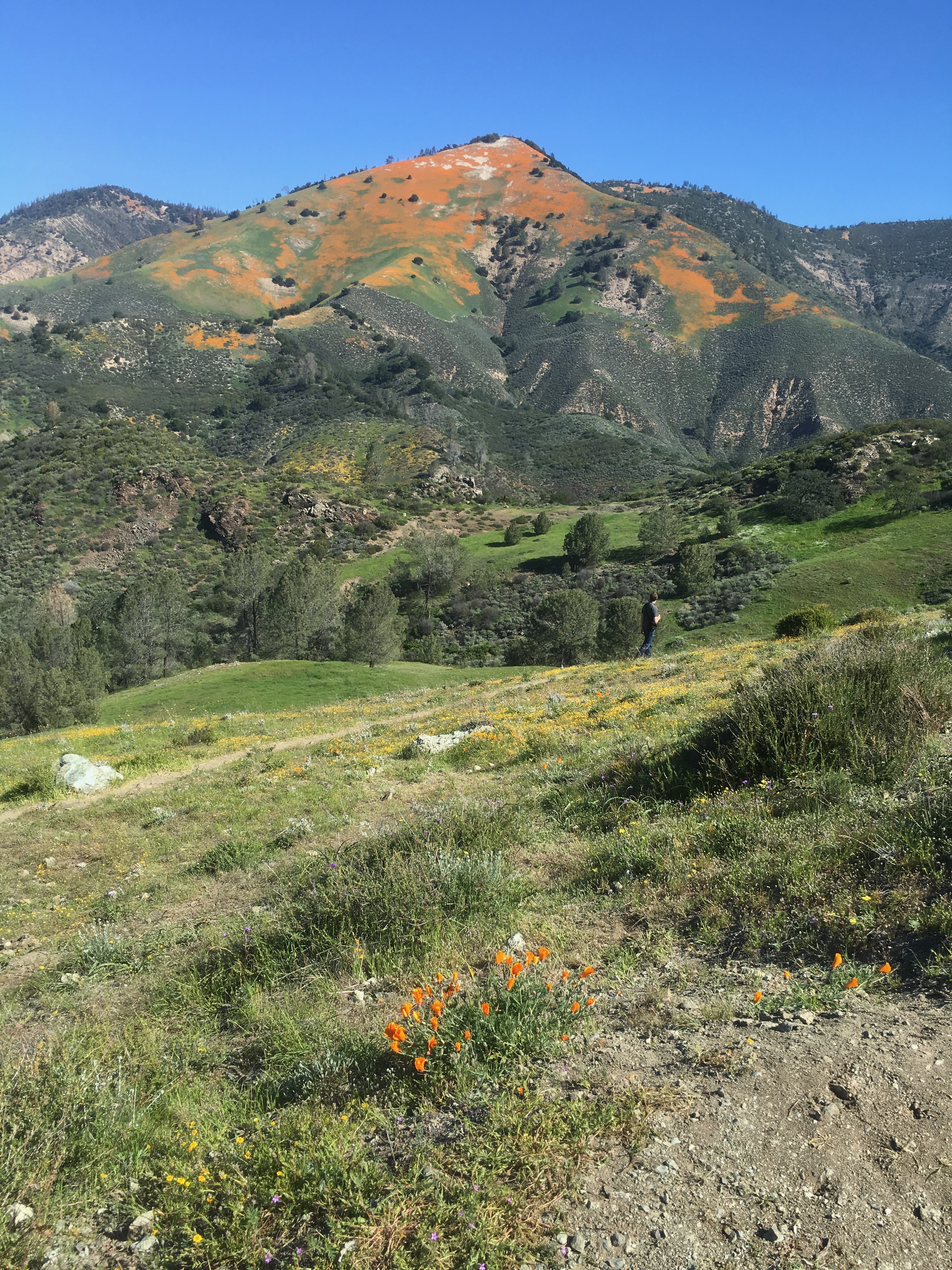Our research group focuses on understanding the processes that both generate and maintain diversity in the identity, characteristics and abundances of species that are found together in natural communities, with a particular focus on vascular plants. Given that community ecology is typically “messy”- that is- it often can be difficult to generalize results from one study or species to another, and that there are over 400,000 plant species on the planet, our group primarily focuses on more general answers to community ecology questions that can emerge from a focus on the functional ecology and phylogenetic context of species. A few of the major research themes in our group are described below.
Experimental tests of the link between trait differences and species coexistence
Ecologists have long been interested in using variation in physiological and functional traits of species to make inferences about the processes that shape communities. While many communities are characterized by nonrandom patterns of trait distributions, it is often challenging to connect these patterns to underlying ecological processes. As many trait-based studies thus far have taken an observational approach, there is much to be gained from exploring these questions using experiments that are informed by coexistence theory. Currently, we using annual plant communities found in serpentine grasslands in California as a model system to better understand the relationship between physiological and functional differences among plants and species coexistence. This set of NSF-funded projects, in collaboration with Dr. Jonathan Levine and others, links mathematical models of species interactions, field experiments, and functional trait sampling to address how functional trait differences between species can be used understand species coexistence at local spatial scales, as well as across spatial and temporally heterogeneous landscapes.
Selected papers:
Mary Van Dyke, Jonathan Levine, Nathan Kraft, 2022. Small rainfall changes drive substantial changes in plant coexistence. Nature, 611:507-511. link
Andrew Kleinhesselink, Nathan Kraft, Stephen Pacala, Jonathan Levine, 2022. Detecting and interpreting higher order interactions in ecological communities. Ecology Letters, 25:1604 –1617. link
Gaurav Kandlikar, Andrew Kleinhesselink, Nathan Kraft, 2022. Functional traits predict species responses to environmental variation in a California grassland annual plant community. Journal of Ecology, 110:833-844. link
Gaurav Kandlikar, Xinyi Yan, Jonathan Levine, Nathan Kraft, 2021. Soil microbes generate stronger fitness differences than stabilization among California annual plants. American Naturalist, 197: E30-E39. link
Gaurav Kandlikar, Christopher Johnson, Xinyi Yan, Nathan Kraft, Jonathan Levine, 2019. Winning and losing with microbes: how microbially mediated fitness differences influence plant diversity. Ecology Letters, 22:1178-1191. link
William Petry, Gaurav Kandlikar, Nathan Kraft, Oscar Godoy, and Jonathan Levine, 2018. A competition-defence trade-off both promotes and weakens coexistence in an annual plant community. Journal of Ecology, 106:1806-1818. link
Oscar Godoy, Daniel Stouffer, Nathan Kraft, Jonathan Levine, 2017. Intransitivity is infrequent and fails to promote annual plant coexistence without pairwise niche differences. Ecology, 98:1193-1200.
Nathan Kraft, Oscar Godoy, Jonathan Levine, 2015. Plant functional traits and the multidimensional nature of species coexistence. Proceedings of the National Academy of Science,112:797-802. PDF
Nathan Kraft, Peter Adler, Oscar Godoy, Emily James, Steve Fuller, Jonathan Levine, 2015. Community assembly, coexistence, and the environmental filtering metaphor. Functional Ecology, 29:592-599. PDF
Tropical forest community assembly and dynamics
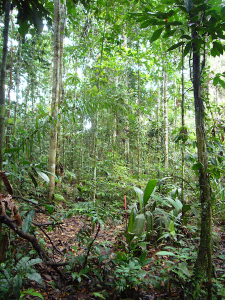 Tropical forests are among the diverse communities on the planet. This diversity is both fascinating and vexing, as community ecologists continue to try to disentangle the mechanisms that allow this diversity to persist. Our research group is interested in understanding both the diversity and the relative importance of various community assembly processes in shaping tropical forest communities. We explore these systems using a variety of approaches, including analyses of spatial co-occurence patterns, null models, and more recently neighborhood dynamics models. A common theme in many of our studies is a focus on functional trait differences and a phylogenetic relatedness as a predictor of variation in ecological strategies among species. In particular, the lab has a longstanding collaboration with Dr. Renato Valencia, who is the Principle Investigator of the Yasuní Forest Dynamics plot in the Ecuadorian Amazon, a 50 hectare forest plot that is remarkable because it contains over 1,100 tree species, making it one of the most diverse forests in the world.
Tropical forests are among the diverse communities on the planet. This diversity is both fascinating and vexing, as community ecologists continue to try to disentangle the mechanisms that allow this diversity to persist. Our research group is interested in understanding both the diversity and the relative importance of various community assembly processes in shaping tropical forest communities. We explore these systems using a variety of approaches, including analyses of spatial co-occurence patterns, null models, and more recently neighborhood dynamics models. A common theme in many of our studies is a focus on functional trait differences and a phylogenetic relatedness as a predictor of variation in ecological strategies among species. In particular, the lab has a longstanding collaboration with Dr. Renato Valencia, who is the Principle Investigator of the Yasuní Forest Dynamics plot in the Ecuadorian Amazon, a 50 hectare forest plot that is remarkable because it contains over 1,100 tree species, making it one of the most diverse forests in the world.
Selected papers:
Ian McFadden, Megan Bartlett, Thorsten Weigand, Benjamin Turner, Lawren Sack, Renato Valencia, Nathan Kraft, 2019. Disentangling the functional trait correlates of spatial aggregation in tropical forest trees. Ecology, 100:e02591. link
Claire Fortunel, Jesse Lasky, María Uriarte, Renato Valencia, Joseph Wright, Nancy Garwood, Nathan Kraft, 2018. Topography and neighborhood crowding can interact to shape species growth and distribution in a diverse Amazonian forest. Ecology, 99:2272-2283.
Claire Fortunel, Renato Valencia, S Joseph Wright, Nancy Garwood, Nathan Kraft, 2016. Functional trait differences influence neighbourhood interactions in a hyperdiverse Amazonian forest. Ecology Letters, 19:1062-1070. link
Xugao Wang, Thorsten Wiegand, Nathan Kraft, Nathan Swenson, Stuart Davies, Zhanqing Hao, Robert Howe, Yiching Lin, Keping Ma, Xiangcheng Mi, Sheng-Hsin Su, I-Fang Sun, Amy Wolf, 2016. Stochastic dilution effects weaken deterministic effects of niche-based processes in species rich forests. Ecology 97:347-360. PDF
Rafael Cardenas, Renato Valencia, Adriana Argoti, Nathan Kraft, Olivier Dangles, 2014. Plant traits predicting herbivory in a highly diverse Neotropical rainforest. Journal of Ecology,102:939-952. PDF
Nathan Kraft, Margaret Metz, Richard Condit and Jerome Chave, 2010. The relationship between wood density and mortality rates in a global tropical forest dataset. New Phytologist, 188:1124-1136. PDF
Nathan Kraft, Renato Valencia, and David Ackerly, 2008. Functional traits and niche-based tree community assembly in an Amazonian forest. Science, 322:580-582 PDF
Plant Floristics and Biogeography
In the era of ecological ‘big data’ there are fascinating opportunities to explore how climate, evolutionary history, and functional diversity interact to generate striking patterns of species turnover across the planet. The causes of these patterns are the key to understanding both how floras are assembled, and also how they might respond to ongoing global change. Our research group is involved in a number of projects devoted to compiling, analyzing, and interpreting patterns of plant diversity at large biogeographic scales.
Selected papers:
François Munoz, Christopher Klausmeier, Pierre Gaüzère, Gaurav Kandlikar, Elena Litchman, Nicolas Mouquet, Annette Ostling, Wilfried Thuiller, Adam Algar, Arnaud Auber, Marc Cadotte, Leo Delalandre, Pierre Denelle, Brian Enquist, Claire Fortunel, Matthias Grenié, Nicolas Loiseau, Lucie Mahaut, Anthony Maire, David Mouillot, Cyrille Violle, Nathan Kraft, 2023. The ecological causes of functional distinctiveness in communities, Ecology Letters, online early. link
Ian McFadden, Brody Sandel, Constantinos Tsirogiannis, Naia Morueta-Holme, Jens-Christian Svenning, Brian Enquist, Nathan Kraft, 2019. Temperature shapes opposing latitudinal gradients of plant taxonomic and phylogenetic β diversity. Ecology Letters 22:1126-1135. link
Brian Enquist et al., 2019. The commonness of rarity: Global and future distribution of rarity across land plants. Science Advances, 5, eaaz0414. link
Gaurav Kandlikar, Marcel Vaz, Ricardo Kreibel, German Vargas, Fabián Michelangeli, Roberto Cordero, Frank Almeda, Gerardo Avalos, Ned Fetcher, Nathan Kraft, 2018. Contrasting patterns of taxonomic, phylogenetic and functional variation along a Costa Rican altitudinal gradient in the plant family Melastomataceae. Journal of Tropical Ecology, 34:204-208. link
Rong Li, Nathan Kraft, Heng Li, 2015. Phylogenetic diversity and species richness in conservation planning within a global biodiversity hotspot. Conservation Biology, 29:1552-1562. PDF
Lamanna et al, 2014. Functional trait space and the latitudinal diversity gradient. Proceedings of the National Academy of Science, 111:13745-13750. PDF
Morueta-Holme et al., 2013. Habitat area and climate stability determine geographic variation in plant species range sizes. Ecology Letters,16:1446-1454. PDF
Kraft et al., 2011. Disentangling the drivers of beta diversity along latitudinal and elevational gradients. Science, 333:755-1758. PDF
Nathan Kraft, Bruce Baldwin, David Ackerly, 2010. Range size, taxon age, and hotspots of neoendemism in the California flora. Diversity and Distributions, 16:403-413. PDF
Phylogenetic relatedness as a tool for ecological inference
Patterns of phylogenetic relatedness can often contain valuable ecological information. In a community context, relatedness can often be used as proxy for the degree of ecological similarity of two species, and can therefore be a powerful tool for ecological analysis in the absence of other species-specific information. Our group has a long-standing interest in the use and development of these approaches, as they can be used to gain insight into logistically challenging communities where information about the ecological strategies of species are unknown or cannot be sampled.
Selected papers:
Oscar Godoy, Nathan Kraft, Jonathan Levine, 2014. Phylogenetic relatedness and the determinants of competitive outcomes. Ecology Letters,17:836-844. PDF
Davies et al. 2013. Phylogenetic conservatism in plant phenology. Journal of Ecology, 101:1520-1530. PDF
Jonathan Davies, Nathan Kraft, Nicolas Salamin, Elizabeth Wolkovich, 2012. Incompletely resolved phylogenetic trees inflate estimates of phylogenetic conservatism. Ecology, 93:242-247. PDF
Nathan Kraft and David Ackerly, 2010. Functional trait and phylogenetic tests of community assembly across spatial scales in an Amazonian forest. Ecological Monographs, 80:401-422. PDF
Nathan Kraft, William Cornwell, Campbell Webb and David Ackerly, 2007. Trait evolution, community assembly, and the phylogenetic structure of ecological communities. The American Naturalist, 170:271-283. PDF
